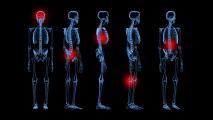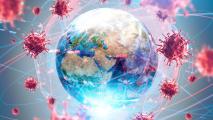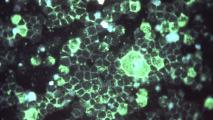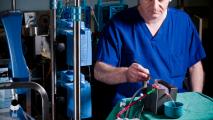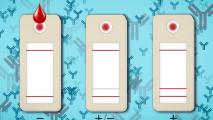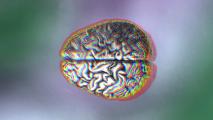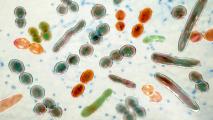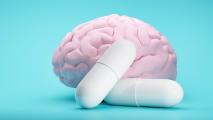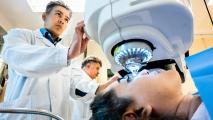
Biotech
Human history has been all but defined by death and disease, plague and pandemic. Advancements in 20th century medicine changed all of that. Now advancements in 21st century medicine promise to go even further. Could we bring about an end to disease? Reverse aging? Give hearing to the deaf and sight to the blind? The answer may be yes. And soon.
More
5 drugs that changed the world (and what went wrong)
Anesthesia, penicillin, antibiotics, diazepam, and the birth control pill have all radically changed our lives.
“Synthetic biomarkers” could catch your cancer in the future
When the body’s own biomarkers aren’t enough, researchers have begun creating their own to help fight cancer.
An international team sets out to cure genetic heart diseases with one shot
Researchers from the UK, US, and Singapore are beginning work on a genetic heart cure they hope to begin clinically testing within five years.
Researchers may have created a universal coronavirus vaccine
All currently licensed COVID-19 vaccines target the spike protein’s S1 region, which is prone to mutations. We need a universal vaccine.
Pfizer’s RSV vaccine is 86% effective at preventing severe illness
According to a huge phase 3 trial, Pfizer’s RSV vaccine is nearly 86% effective at preventing severe illness in older adults.
Scientists convert kidney to universal “O” blood type
Kidneys still need to be tissue matched, but by converting them to type O, more will be available for transplant.
MIT just created a test that can tell if you’re immune to COVID-19
MIT researchers have developed an easy-to-use test that may be able to predict an individual’s immune response to SARS-CoV-2.
New epilepsy treatment could stop seizures in their tracks
A new epilepsy treatment that’s delivered as a nasal spray may be able to prevent seizures or even interrupt them.
A sepsis-catching AI has proven effective in hospitals
A new AI for spotting sepsis, which accounts for ⅓ of hospital deaths, was found to be effective in a large trial.
What smart toilet seats reveal about digital health’s evolution
Digital health is attracting record levels of investment in products such as smart toilet seats, which can help millions get access to care.
First personalized CRISPR therapy approved for trial
The FDA has approved a trial for the first personalized CRISPR therapy, which was developed to treat Duchenne muscular dystrophy.
Light pulses can stop dangerous food poisoning like Salmonella
A team at Penn State has developed a pulsed light technique capable of killing common food poisoning pathogens.
Synthetic cartilage is now stronger than the real stuff
Using a heating process, Duke researchers have created a synthetic cartilage hydrogel that can outperform the real thing.
Mouse embryos with beating hearts have been created entirely in the lab
Researchers at the Weizmann Institute of Science have developed mouse embryos, complete with organ structures, purely from stem cells.
Which microbes live in your gut? A microbiologist tries at-home test kits
A microbiologist looks at how home test kits work, what kind of information they provide and if they can really help change your gut.
You no longer need a prescription to buy hearing aids in the US
The FDA is making over-the-counter hearing aids available to Americans, potentially making the devices cheaper and more accessible.
AI has mapped all of the world’s known ant species
Using over a million data points and a machine learning algorithm, a team of researchers has mapped all of the ant species currently known.
Mathematicians suggest the “37% rule” for life’s biggest decisions
Mathematicians tell us that, to maximize the chances of the best outcome, we ought to ditch the first 37% of any options.
New kind of schizophrenia drug aces human trial
KarXT, a new schizophrenia treatment that addresses a wider range of symptoms than existing meds, has aced a phase 3 trial.
Eye implant made from pig skin reverses blindness in 14 people
Using collagen from pig skin, Swedish researchers created an artificial cornea that reversed blindness in 14 people.
Get inspired with the most innovative stories shaping the world around us.














